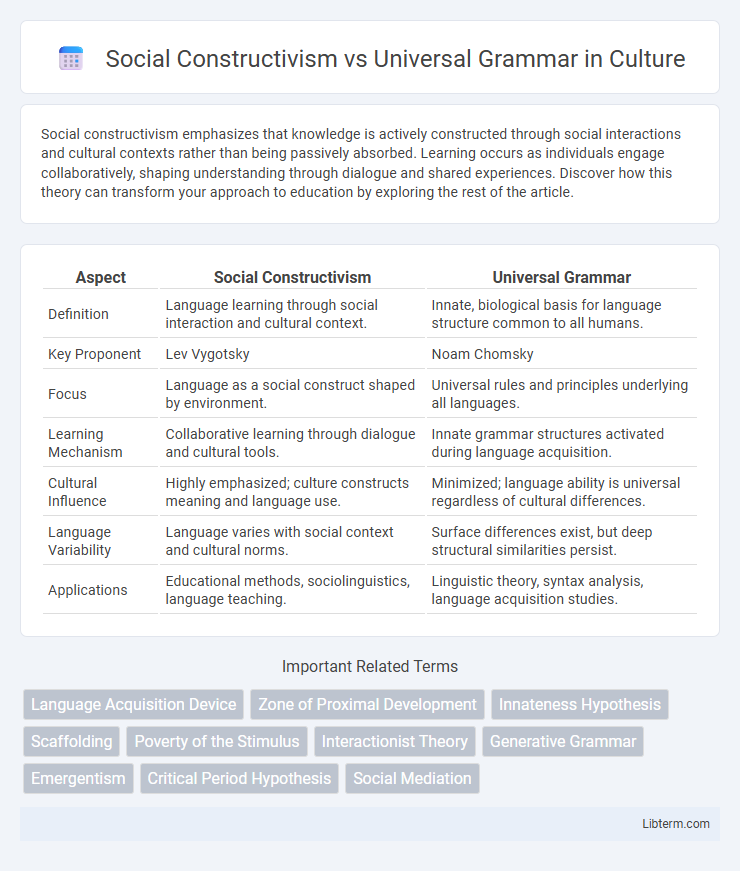Social constructivism emphasizes that knowledge is actively constructed through social interactions and cultural contexts rather than being passively absorbed. Learning occurs as individuals engage collaboratively, shaping understanding through dialogue and shared experiences. Discover how this theory can transform your approach to education by exploring the rest of the article.
Table of Comparison
| Aspect | Social Constructivism | Universal Grammar |
|---|---|---|
| Definition | Language learning through social interaction and cultural context. | Innate, biological basis for language structure common to all humans. |
| Key Proponent | Lev Vygotsky | Noam Chomsky |
| Focus | Language as a social construct shaped by environment. | Universal rules and principles underlying all languages. |
| Learning Mechanism | Collaborative learning through dialogue and cultural tools. | Innate grammar structures activated during language acquisition. |
| Cultural Influence | Highly emphasized; culture constructs meaning and language use. | Minimized; language ability is universal regardless of cultural differences. |
| Language Variability | Language varies with social context and cultural norms. | Surface differences exist, but deep structural similarities persist. |
| Applications | Educational methods, sociolinguistics, language teaching. | Linguistic theory, syntax analysis, language acquisition studies. |
Introduction to Language Acquisition Theories
Social Constructivism emphasizes language acquisition through social interaction, highlighting the role of environment, culture, and communication in developing linguistic skills. Universal Grammar, proposed by Noam Chomsky, argues that humans possess an innate, biological language faculty with a set of grammatical principles common to all languages. Both theories contribute to understanding how individuals acquire language, with Social Constructivism focusing on external social factors and Universal Grammar emphasizing inborn cognitive structures.
Defining Social Constructivism in Linguistics
Social constructivism in linguistics emphasizes that language acquisition and development are fundamentally shaped by social interactions and cultural contexts, highlighting the role of communication within communities. It asserts that linguistic knowledge is constructed through collaborative processes and shared experiences rather than innate biological structures. This perspective contrasts with Universal Grammar by prioritizing external social factors over inherent grammatical frameworks in understanding language learning.
Understanding Universal Grammar Theory
Universal Grammar theory posits that humans possess an innate set of grammatical principles shared across all languages, enabling native language acquisition naturally. This theory, pioneered by Noam Chomsky, suggests that the brain is pre-wired with a universal syntax framework, which explains the rapid learning of language in early childhood. Understanding Universal Grammar involves examining linguistic structures that are consistent worldwide, reflecting a biological foundation of language rather than purely social or cultural learning processes.
Historical Context and Development of Both Theories
Social Constructivism, rooted in the work of Lev Vygotsky during the early 20th century, emphasizes language acquisition through social interaction and cultural context, highlighting the role of collaborative learning in cognitive development. Universal Grammar, proposed by Noam Chomsky in the 1950s, argues for an innate, biologically determined linguistic structure shared across all humans, revolutionizing the study of syntax and language processing. The historical development of these theories reflects a shift from behaviorist explanations of language learning to cognitive and biological perspectives, sparking ongoing debates in linguistics and psychology.
Core Principles: Social Interaction vs Innate Structures
Social Constructivism emphasizes the role of social interaction and cultural context in language development, positing that knowledge is constructed collaboratively through communication within a community. Universal Grammar theory asserts that humans possess innate, biologically hardwired linguistic structures guiding language acquisition uniformly across all languages. The core difference lies in Social Constructivism attributing language learning to external social processes, whereas Universal Grammar centers on inherent cognitive mechanisms predisposing individuals for language.
Evidence Supporting Social Constructivism
Studies of language acquisition highlight the critical role of social interaction, with children learning grammar and vocabulary through dialogic exchanges and collaborative meaning-making, supporting social constructivism. Research documenting language development in varied cultural contexts shows significant differences, challenging the universality proposed by Universal Grammar and emphasizing socially mediated learning processes. Neurocognitive evidence reveals that language areas in the brain are shaped by social engagement rather than innate grammatical structures alone.
Empirical Support for Universal Grammar
Empirical support for Universal Grammar (UG) is grounded in cross-linguistic studies demonstrating innate language acquisition mechanisms evident in children's rapid and uniform mastery of complex grammatical rules. Neurolinguistic research identifies specific brain regions, such as Broca's area, activated during syntactic processing, reinforcing the biological basis of UG. Contrastingly, Social Constructivism emphasizes language learning through social interaction and cultural context, yet struggles to account for the uniformity and rigidity observed in innate grammatical structures across diverse languages.
Key Critiques and Debates in the Field
Social Constructivism is critiqued for underestimating innate cognitive structures, while Universal Grammar faces challenges over its biological basis and language universality claims. Debates focus on whether language acquisition is primarily driven by social interaction and cultural context or by innate grammatical knowledge hardwired in the brain. Empirical studies question the sufficiency of Universal Grammar to explain linguistic diversity, whereas Social Constructivism is contested for potentially overlooking neurological constraints in language learning.
Implications for Language Learning and Education
Social Constructivism emphasizes the role of social interaction and cultural context in language learning, suggesting that language acquisition is deeply influenced by collaborative experience and meaningful communication. In contrast, Universal Grammar posits an innate, biological foundation for language, implying education should leverage inherent grammatical structures present in all humans to facilitate learning. Understanding these perspectives guides educators to balance interactive, context-rich environments with explicit instruction on underlying linguistic rules for effective language pedagogy.
Future Directions in Language Acquisition Research
Future directions in language acquisition research emphasize integrating Social Constructivism's emphasis on interactive, culturally situated learning with Universal Grammar's innate grammatical frameworks to develop hybrid models. Advanced neuroimaging and computational techniques promise to clarify how social contexts influence the activation of Universal Grammar parameters during language development. Investigations will focus on cross-linguistic variability and real-time social interactions to refine theories that accommodate both biological predispositions and environmental factors in acquiring language.
Social Constructivism Infographic

 libterm.com
libterm.com